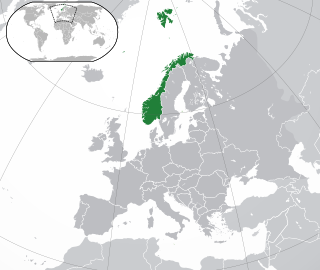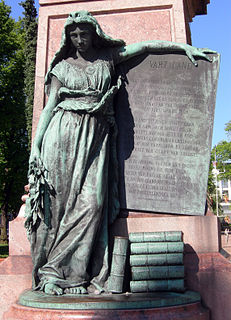Liberal feminism, also called mainstream feminism, is a main branch of feminism defined by its focus on achieving gender equality through political and legal reform within the framework of liberal democracy. As the oldest of the "Big Three" schools of feminist thought, liberal feminism has its roots in 19th century first-wave feminism that focused particularly on women's suffrage and access to education, and that was associated with 19th century liberalism and progressivism. Traditional liberal feminism has a strong focus on political and legal reforms aiming to give women equal rights and opportunities. Liberal feminists argue that society holds the false belief that women are, by nature, less intellectually and physically capable than men; thus it tends to discriminate against women in the academy, the forum, and the marketplace. Liberal feminists believe that "female subordination is rooted in a set of customary and legal constraints that blocks women's entrance to and success in the so-called public world", and strive for sexual equality via political and legal reform. Liberal feminism "works within the structure of mainstream society to integrate women into that structure."
A fakaleitī is a Tongan individual assigned male at birth who has a feminine gender expression.

The position of Minister for Women and Gender Equality in the Canadian cabinet has existed since 2018, following the passage of the Budget Implementation Act, 2018, No. 2 and the creation of the Department for Women and Gender Equality.

Gender equality, also known as sexual equality or equality of the sexes, is the state of equal ease of access to resources and opportunities regardless of gender, including economic participation and decision-making; and the state of valuing different behaviors, aspirations and needs equally, regardless of gender.

Harald Meldal Eia is a Norwegian comedian, sociologist and documentarian.

Norway, like the other Scandinavian countries, is very progressive in regards to lesbian, gay, bisexual and transgender (LGBT) rights. In 1981, Norway became one of the first countries in the world to enact an anti-discrimination law explicitly including sexual orientation. Same-sex marriage, adoption, and assisted insemination treatments for lesbian couples have been legal since 2009. In 2016, Norway became the fourth country in Europe to pass a law allowing the change of legal gender for transgender people solely based on self-determination.
United Kingdom employment equality law is a body of law which legislates against prejudice-based actions in the workplace. As an integral part of UK labour law it is unlawful to discriminate against a person because they have one of the "protected characteristics", which are, age, disability, gender reassignment, marriage and civil partnership, race, religion or belief, sex, pregnancy and maternity, and sexual orientation. The primary legislation is the Equality Act 2010, which outlaws discrimination in access to education, public services, private goods and services, transport or premises in addition to employment. This follows three major European Union Directives, and is supplement by other Acts like the Protection from Harassment Act 1997. Furthermore, discrimination on the grounds of work status, as a part-time worker, fixed term employee, agency worker or union membership is banned as a result of a combination of statutory instruments and the Trade Union and Labour Relations (Consolidation) Act 1992, again following European law. Disputes are typically resolved in the workplace in consultation with an employer or trade union, or with advice from a solicitor, ACAS or the Citizens Advice Bureau a claim may be brought in an employment tribunal. The Equality Act 2006 established the Equality and Human Rights Commission, a body designed to strengthen enforcement of equality laws.
The Norwegian Association for Women's Rights is a Norwegian nonpartisan political advocacy organisation and Norway's oldest and preeminent women's and girls' rights organisation. NKF works "to promote gender equality and women's and girls' human rights through political and legal reform within the framework of liberal democracy". It is liberal feminist in orientation and has had a central role in the adoption of all major gender equality legislation and reforms since 1884. NKF stands for an inclusive feminism grounded in liberal values, and has always been open to both women and men. It consists of a national-level association as well as regional chapters based in the larger cities, and is led by a national-level executive board.

Women's Equality Day is celebrated in the United States on August 26 to commemorate the 1920 adoption of the Nineteenth Amendment to the United States Constitution, which prohibits the states and the federal government from denying the right to vote to citizens of the United States on the basis of sex. It was first celebrated in 1972, designated by Congress in 1973, and is proclaimed each year by the United States President.
Inger-Else "Ingse" Stabel is a Norwegian judge.
All-women shortlists (AWS) is an affirmative action practice intended to increase the proportion of female Members of Parliament (MPs) in the United Kingdom, allowing only women to stand in particular constituencies for a particular political party. Only the Labour Party and Liberal Democrats currently use this practice. Political parties in other countries, such as South Korea and various Latin American countries have used practices analogous to AWS, especially in relation to government sex quotas. AWS and practices similar to it have had mixed impacts in terms of the percentage of candidacies and offices women hold as a result of their use.
The Nordic Gender Institute (NIKK), previously Nordic Institute for Women's Studies and Gender Research, was a transnational resource and information centre for gender research and gender equality in the Nordic countries. It was established in 1995 by the Nordic Council of Ministers and closed down in 2011.

Ole Petter Ottersen is a Norwegian physician and neuroscientist. He serves as the Rector of Karolinska Institute in Sweden, and took office in August 2017. Ottersen has been professor of medicine at the University of Oslo since 1992 and served as the university's directly elected Rector from 2009 to 2017.
State feminism is feminism created or approved by the government of a state or nation. It usually specifies a particular program. The term was coined by Helga Hernes with particular reference to the situation in Norway, which had a tradition of government-supported liberal feminism dating back to the 1880s, and is often used when discussing the government-supported gender equality policies of the Nordic countries, that are linked to the Nordic model. The term has also been used in the context of developing countries where the government may prescribe its form of feminism and at the same time prohibit non-governmental organizations from advocating for any other feminist program. In this sense it is possible to distinguish between a liberal state feminism found in Western democracies such as the Nordic countries, and a somewhat more authoritarian state feminism that is often also linked to secularism, found e.g. in certain Middle Eastern countries.
Øystein Gullvåg Holter is a Norwegian sociologist and expert on men's studies. Son of Harriet Holter. He is Professor of men's studies at the University of Oslo, the first to be appointed to such a chair in Norway. He worked as a researcher at the Work Research Institute from 1980 to 2006, and at the Nordic Gender Institute from 2006 to 2008. His fields of research are work and family, gender equality and historical sociology. He was a member of the Equality Commission, established by a Royal Decree of 12 February 2010 in order to report on Norway’s equality policies.

Hege Skjeie was a Norwegian political scientist and feminist.

The Gender Equality and Anti-Discrimination Ombud is a Norwegian ombudsman for gender equality and anti-discrimination, and is appointed for a term of six years by the King-in-Council, in effect by the Government of Norway. The ombudsman heads the similarly named government agency.

Women in Finland enjoy a "high degree of equality" and "traditional courtesy" among men. In 1906, the women of Finland became the first women in Europe to be granted the right to vote. There are many women in Finland who hold prominent positions in Finnish society, in the academics, in the field of business, and in the government of Finland. An example of powerful women in Finnish politics is Tarja Halonen, who became the first female president of the country. In religion, where most of the Finnish people are members of the Evangelical Lutheran Church of Finland, women can be ordained as priests. In terms of finance, Finnish women have been described as "usually independent financially". Married women, by custom, introduces themselves by mentioning their forename first, then their maiden name, and then the surname of their husbands. The Telegraph has written:
Finnish women are much more outgoing and approachable than the men and often command three or four languages. Their position in society and business is well-respected and superior to that of women in most other cultures.
Gender representation on corporate boards of directors refers to the proportion of men and women who occupy board member positions. To measure gender diversity on corporate boards, studies often use the percentage of women holding corporate board seats and the percentage of companies with at least one woman on their board. Globally, men occupy more board seats than women. As of 2018, women held 20.8% of the board seats on Russell 1000 companies. Most percentages for gender representation on corporate boards refer only to public company boards. Private companies are not required to disclose information on their board of directors, so the data is less available.
Transgender rights in the United Kingdom have been gaining ground since the 1990s, with the granting of rights and protection to the transgender community. Various laws within the United Kingdom refer to identity documents, marriage rights, and anti-discrimination measures used by or pertaining to transgender people, in the areas of employment, education, housing and social services, amongst others.








